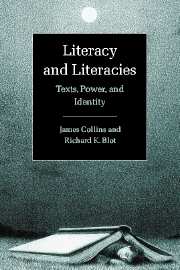Book contents
- Frontmatter
- Contents
- List of figures
- Foreword by Brian V. Street
- Preface
- Acknowledgments
- 1 Introduction: texts, power, and identity
- 2 The literacy thesis: vexed questions of rationality, development, and self
- 3 Situated approaches to the literacy debate
- 4 Literacies and power in modern nation states: Euro-American lessons
- 5 Literacies and identity formation: American cases
- 6 Literacy, power, and identity: colonial legacies and indigenous transformations
- 7 Conclusion: literacy lessons – beginnings, ends, and implications
- Notes
- References
- Index
- Studies in the Social and Cultural Foundations of Language
4 - Literacies and power in modern nation states: Euro-American lessons
Published online by Cambridge University Press: 22 September 2009
- Frontmatter
- Contents
- List of figures
- Foreword by Brian V. Street
- Preface
- Acknowledgments
- 1 Introduction: texts, power, and identity
- 2 The literacy thesis: vexed questions of rationality, development, and self
- 3 Situated approaches to the literacy debate
- 4 Literacies and power in modern nation states: Euro-American lessons
- 5 Literacies and identity formation: American cases
- 6 Literacy, power, and identity: colonial legacies and indigenous transformations
- 7 Conclusion: literacy lessons – beginnings, ends, and implications
- Notes
- References
- Index
- Studies in the Social and Cultural Foundations of Language
Summary
At the base of the modern social order stands not the executioner but the professor. Not the guillotine, but the (aptly named) doctorat d'état is the main tool and symbol of state power. The monopoly of legitimate education is now more important, more central than is the monopoly of legitimate violence. When this is understood, then the imperative of nationalism, its roots, not in human nature as such, but in a certain kind of now pervasive social order, can also be understood.
(Gellner, 1983, p. 34)Introduction
We have argued in the preceding chapters that the “literacy thesis” attributing extensive sociocultural and cognitive change to a general literacy was untenable, but also that the situated, ethnographic approach – notwithstanding the contributions of studies within this tradition – has failed to confront the intellectual, cultural, and political significance of the dichotomy oral/written. We are going to suggest a way out of this impasse by drawing upon and presenting historical accounts. Historical studies of the “uses of literacy” during different phases of modern Western culture portray a complex interplay of text-and-talk which was part of the emergence of new forms of identity, power, and communication. Such historical research supports the emphasis on a “bottom-up” view of literacy taken by ethnographers of literacy, but it also suggests specific connections between changing literacy practices and political and economic conditions in Europe and North America.
- Type
- Chapter
- Information
- Literacy and LiteraciesTexts, Power, and Identity, pp. 67 - 98Publisher: Cambridge University PressPrint publication year: 2003



